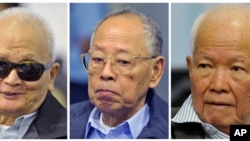PHNOM PENH - A former investigating judge at the Khmer Rouge tribunal says he is sure that the regime’s former social affairs minister, Ieng Thirith, will never be tried.
Ieng Thirith, the wife of the regime’s foreign minister, Ieng Sary, was released to house arrest by the UN-backed court earlier this year after she was found mentally unfit to stand trial.
Former judge Marcel Lemonde, who left the tribunal in November 2010, says She will never see trial. “That is assured,” he said. But he also said there is a chance the other aged leaders currently on trial may never see justice.
In an interview with VOA Khmer, Lemonde said they may not live to see the end of trial, or they may too become too infirm to participate.
Lemonde, who oversaw the international section for the investigating judges office during the primary indictments of the court, said he would be disappointed if the suspects did not go through a full trial.
But he said the tribunal overall will leave a positive impact, for prompting more discussion in society about the regime, for creating a chance to put Khmer Rouge history in schools, “and an occasion for Cambodians to speak out about the past.”
Still, Cambodians may never get the full truth behind the regime, as those leaders on trial may be buried with their secrets, he said.
“We would hope that the accused take the occasion to explain their point of view, and we are here to listen to them too,” he said. “But after all, they have the right of silence, which is stated in the proceedings, and victims would probably be disappointed.”
Ieng Thirith, the wife of the regime’s foreign minister, Ieng Sary, was released to house arrest by the UN-backed court earlier this year after she was found mentally unfit to stand trial.
Former judge Marcel Lemonde, who left the tribunal in November 2010, says She will never see trial. “That is assured,” he said. But he also said there is a chance the other aged leaders currently on trial may never see justice.
In an interview with VOA Khmer, Lemonde said they may not live to see the end of trial, or they may too become too infirm to participate.
Lemonde, who oversaw the international section for the investigating judges office during the primary indictments of the court, said he would be disappointed if the suspects did not go through a full trial.
But he said the tribunal overall will leave a positive impact, for prompting more discussion in society about the regime, for creating a chance to put Khmer Rouge history in schools, “and an occasion for Cambodians to speak out about the past.”
Still, Cambodians may never get the full truth behind the regime, as those leaders on trial may be buried with their secrets, he said.
“We would hope that the accused take the occasion to explain their point of view, and we are here to listen to them too,” he said. “But after all, they have the right of silence, which is stated in the proceedings, and victims would probably be disappointed.”







